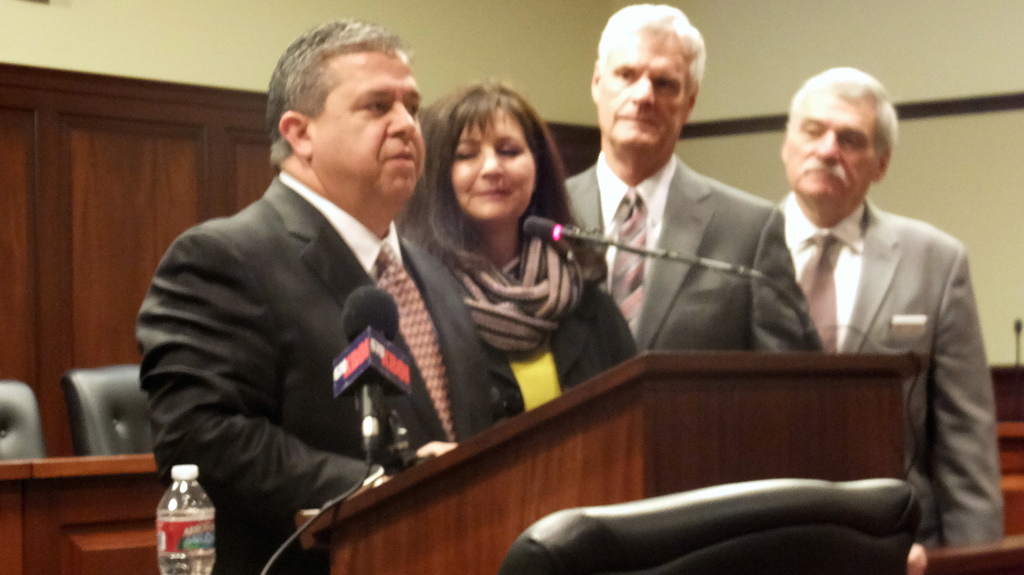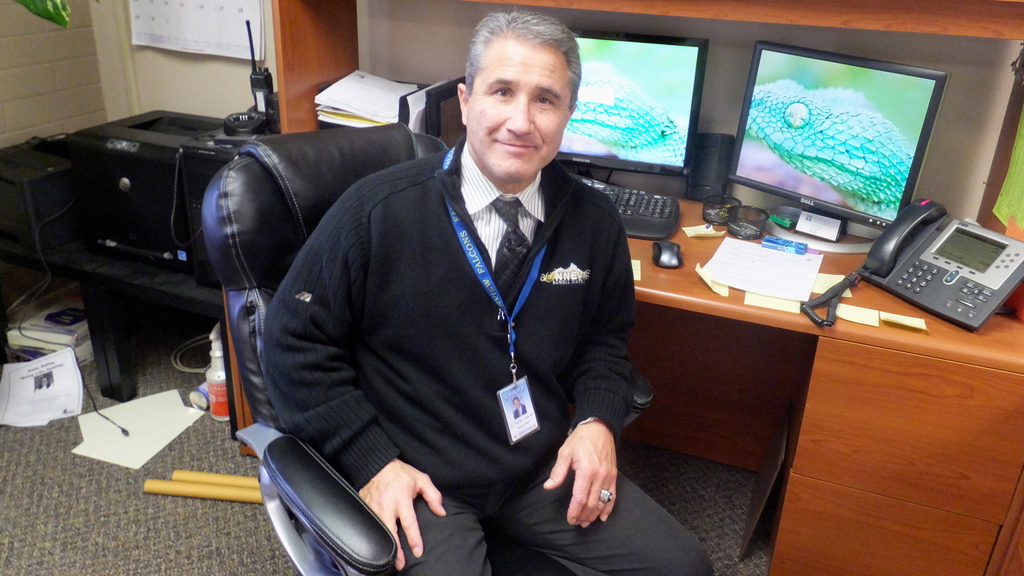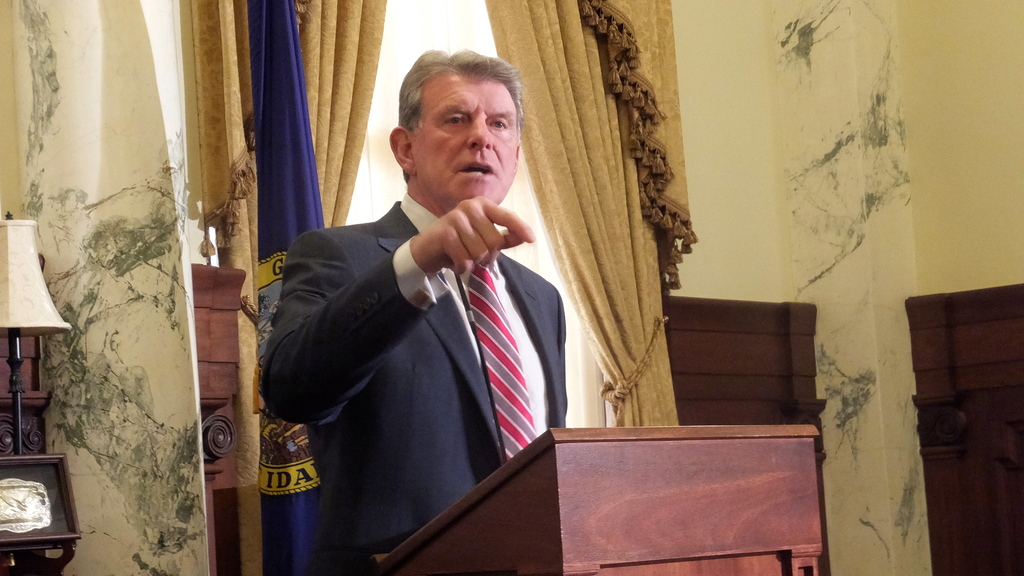Hours before Tom Luna made his surprise announcement that he would not seek re-election, Gov. Butch Otter placed a pre-dawn phone call asking the schools chief to hold off.

“He wanted to know if I had really thought it through,” Luna said. “The governor didn’t say, ‘I want to talk you out of this.’ What he said is, ‘Can we take more time to discuss this?’”
The night before, on Sunday, Luna called Otter and key lawmakers to tell them he would step down when his term ends.
After staying up most of the night thinking about it, Otter wasn’t sure if Luna was making the right move.
“I called him back later, the next morning in fact, and said, ‘Tom… you still have a little time, you might want to give it a little more time.’” Otter said. “Sometimes you make those decisions when your chin is kind of dragging on the ground (which is) why it ends it up as seller’s remorse – and Tom really loved the job.”
Otter reached out to Luna, he said, because many of his friends in public service regretted decisions not to seek re-election.
“I always caution people, you know, ‘Don’t make these decisions when you’re getting beat up by the editorial vigilantes,’” Otter said. “Don’t make them in that negative vacuum, give yourself a little bit of time.”
Despite Otter’s efforts to get Luna to rethink his decision, Luna, and his wife, Cindy, had made their minds up.
Less than five hours after talking with Otter on Jan. 27, Luna, his family and supporters faced a crowded Statehouse committee room full of journalists and TV cameras.
Luna said his name won’t appear on a ballot this year. He was stepping aside to take politics and distractions out of the education reform process.
“I regret how tough it was on my family,” Luna said the day after his announcement. “I don’t regret how tough it was on me — you choose to do things as an elected official. I always tell people: ‘You can be state superintendent as long as you want — as long you ask for more money and defend the status quo.’”
Strong feelings, strong reactions
Luna knows Idahoans have strong opinions of him. As the architect of the Students Come First laws voters repealed in November 2012, Luna was the subject of protests and even a failed recall effort.
“Tom Luna has been a controversial figure almost from the day he first announced he was running for office more than a decade ago,” said longtime political observer and Boise State University professor emeritus Jim Weatherby. “Love him or hate him, Tom Luna has been one of the more interesting politicians we’ve had in a long time.”
Luna knows why people feel that way.
“When you go implement reform and cause people to change, man, people start resisting,” Luna said. “Everybody wants to go to heaven, but nobody wants to die to go there. We resist change.”

Even with all of the noise and media speculation that Luna said cast a shadow over his policy efforts, he enjoyed unwavering support from many prominent educators.
Bonneville Joint School District Superintendent Chuck Shackett – Idaho’s reigning Superintendent of the Year – described Luna as a courageous innovator.
“I believed ISTARS (a teacher pay proposal) and Students Come First were exactly what students of Idaho needed,” Shackett said. “Unfortunately, the public was, I believe, duped into thinking otherwise by a strong campaign against the initiatives.”
Shackett, who leads the state’s fifth largest school district, pointed to task force recommendations that mirror elements of the repealed props – especially on transforming teacher pay and utilizing increased technology.
“Wait five to eight years,” Shackett said. “I promise all those things (voters repealed) will be in our school system. They were good. They were needed.”
Another longtime political observer, David Adler, paints a picture of a changed man in Luna.
Adler, executive director of BSU’s Andrus Center for Public Policy, said many Idahoans felt surprised, confused and uninvolved in the Students Come First process.
The antithesis, Adler said, is how Luna handled his work on the task force and dealing with Common Core standards. Luna sought input from all corners of the state and listened well. He also displayed a pragmatic side by listening to the concerns of teachers, education experts and attempting to offer flexibility and a phased-in approach.

“He’s evolved, he accepted he probably made mistakes, but I think he’s taken a turn professionally and learned from those missteps,” Adler said. “Frankly, it’s an exciting improvement for any officeholder.”
Otter said the voter repeal was hard on him and Luna.
“I don’t quite know what word to use when we lost the three props,” Otter said. “I think that if it didn’t bend awful hard I think that it dented (Luna’s) spirit,” Otter said. “But I was convinced, I still am convinced, that it wasn’t the product itself. It was the process.”
Luna looks back
Over the past seven years, Luna said his brightest days on the job have come when he is surrounded by students.
“By far best part of the job and the part I always enjoy most was getting in schools and visiting classrooms watching effective instruction happen and visiting students,” Luna said. “The younger ones are adorable and inspire me. They all have dreams.”
On the policy side, Luna said his biggest accomplishments were pushing for change.
He lists expanding dual credit programs, connecting rural classrooms through the Idaho Education Network and pushing for an overhaul of the teacher salary schedule as his biggest accomplishments.
But as support for the task force recommendations builds, Luna said the state likely would not have got to this point without the Students Come First debate.
“We were stuck in a rut,” Luna said. “There was a malaise. People were defending a system they were frustrated with and it was very difficult to make changes around the edges of education. Students Come First broke that mold.
“If there was a political price to pay because of that, then I am comfortable with that.”
With politics off the table, Luna said he will spend the duration of his term fighting to implement the task force recommendations.
If that plays out, Adler said, Luna’s detractors may need to reconsider how they look at him.
“It may well be the case he thought he was doing his own party a favor so it would not be laboring under negative thoughts associated with the superintendent,” Adler said. “It might be the case that it was altruistic of him to set politics aside so he can concentrate fully on pushing through measures he embraced and believes are so important to Idaho’s educational future. If that is his motive, then you have to give him a lot of credit.”
Luna’s career, at a glance:
- 1984: President and founder of Scales Unlimited, based in Nampa.
- 1997-2000: Commissioner and chairman of Idaho Standards Commission, a group that worked on developing academic standards for all grades and subjects.
- 1994-2001: Trustee and chairman, Nampa School Board.
- 2000-2002: Chairman of Idaho’s Assessment and Accountability Commission, a group appointed to create an assessment test to measure new standards.
- 2003-2005: Senior adviser to then-U.S. Secretary of Education Rod Paige.
- 2007-present: Superintendent of public instruction: elected in November 2006, re-elected in November 2010.
Click here to read Kevin Richert’s story looking at the road ahead for Luna.
